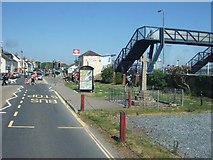Where do buses go?
We took the bus to the coast the other day; using public transport means that we can walk from A to B without needing to walk back from B to A. (For the record, A was Dawlish Warren, B was Dawlish, and we walked along the sea-wall.) Part way there, the bus deviated from the main road. "I wonder", asked Tina, "why the bus goes this way in this village, and usually stays on the main road?"
We thought about it. The village of Starcross is beside the Exe estuary. The main road runs between the houses and the railway and river, so is wholly on the west side of the main road. So taking a deviation through back streets means that more people are closer to the bus route than if the bus stayed on the main road. For the price of a slight increase of journey time, the average distance travelled by passengers was much reduced.
And we thought about other bus routes we know. Some do deviate off the main road to go through, or closer to housing. Does anyone do cost-benefit analysis about it? Or are such bus routes determined heuristicly? The research papers that I have seen about bus operations are all concerned with scheduling the vehicles and their crews, not determining the routes.
The next step in our pondering about O.R. and buses was to wonder about when the company judges it worthwhile altering a bus route to serve new housing. There's a new housing estate on the edge of Exeter, which is not served by any public transport, but we frequently see people struggling the quarter mile or more from the nearest bus stop with their shopping bags. But to bring an existing bus service into that estate would mean rescheduling that service and have implications for the staff rotas as well. So it may be some time until that estate gets a regular service.
Any research on these topics out there?
We thought about it. The village of Starcross is beside the Exe estuary. The main road runs between the houses and the railway and river, so is wholly on the west side of the main road. So taking a deviation through back streets means that more people are closer to the bus route than if the bus stayed on the main road. For the price of a slight increase of journey time, the average distance travelled by passengers was much reduced.
And we thought about other bus routes we know. Some do deviate off the main road to go through, or closer to housing. Does anyone do cost-benefit analysis about it? Or are such bus routes determined heuristicly? The research papers that I have seen about bus operations are all concerned with scheduling the vehicles and their crews, not determining the routes.
The next step in our pondering about O.R. and buses was to wonder about when the company judges it worthwhile altering a bus route to serve new housing. There's a new housing estate on the edge of Exeter, which is not served by any public transport, but we frequently see people struggling the quarter mile or more from the nearest bus stop with their shopping bags. But to bring an existing bus service into that estate would mean rescheduling that service and have implications for the staff rotas as well. So it may be some time until that estate gets a regular service.
Any research on these topics out there?



Interesting post ... I agree I haven't seen much research on this problem either, so it must be heuristic, and a combination of: personal experience, influence factors (political smell here) and profit motives.
ReplyDeleteI once heard a talk about an (Indian) prof. in US who was asked by a private bus company in Mumbai, India to help them out in reassessing the routes (and the schedules) of the buses to maximize profit. My guess is that the prof. had some connection w/ somebody in that company which is why he landed that project - this definitely isn't common place (at least not at all in India). The prof. ended up using a few heuristics to get to some reasonable solution which seemed better than the existing one and also got the union nod.
A side note: the web site link on your profile page seems dead.